ISAAA Holds Asian Virtual Roadshow on Impact of GM Crops
| |
ISAAA, in partnership with CropLife Asia and Biotech Information Centers (BICs) in selected Asian countries, conducts a series of webinars on the global impact of genetically modified (GM) crops. The webinars, which served as a virtual information roadshow, feature the latest report of PG Economics titled GM Crops: Global Socio-economic and Environmental Impacts 1996-2018 authored by Graham Brookes and Peter Barfoot.
For each webinar, Graham Brookes shared the agricultural environmental impact, return on investment for the GM crop farmers, and contribution to global food security of GM crops. Brookes is an agricultural economist and consultant with more than 30 years' experience of examining economic issues relating to the agricultural and food sectors. He is a specialist in analyzing the impact of technology, policy changes, and regulatory impact.
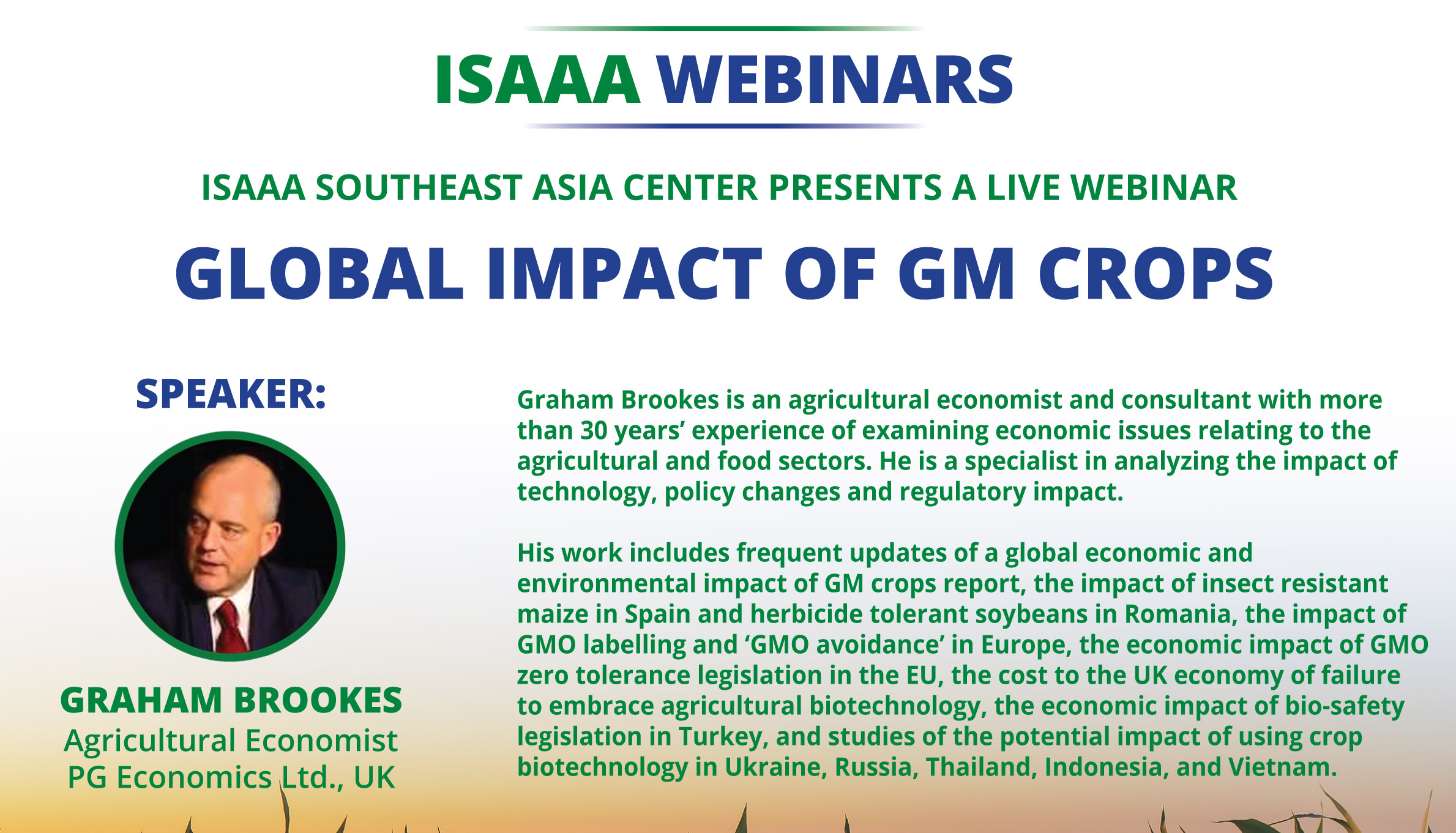
ISAAA SEAsiaCenter Director, Dr. Rhodora Romero-Aldemita, also tackled the global adoption of GM crops in 2018/2019. The BICs also invited experts from their respective countries to share their experiences in GM crop adoption or research and development.
Attendance to the webinars is free of charge.
China
September 21, 2020
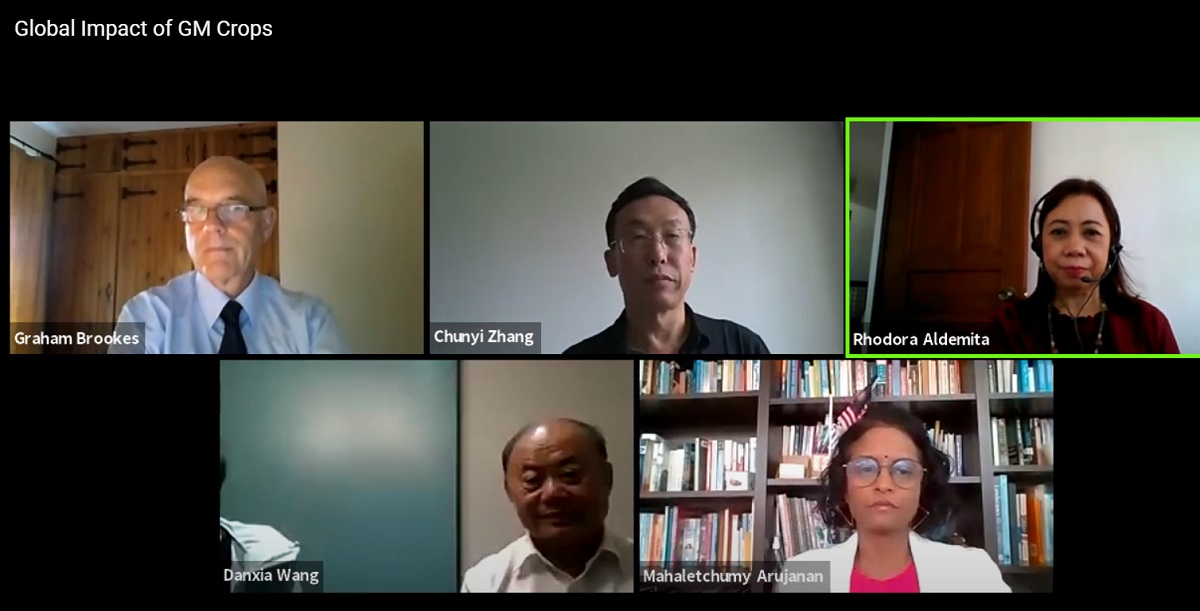
China Biotechnology Information Center co-organized the first webinar which was broadcasted through Zoom, Vhall (a Chinese broadcasting platform), Youtube, and Facebook.
Brookes reported that the Chinese economy has been impacted by insect resistant cotton since it was adopted in 1997. In 2016, 95% of the cotton production in the country was GM.
Mr. Maotang Zu, President of the Farmer Technology Association from the Gaobeidian City of Hebei Province, shared how Bt cotton improved farmers' lives by gaining an average of 10-fold increase in their produce.
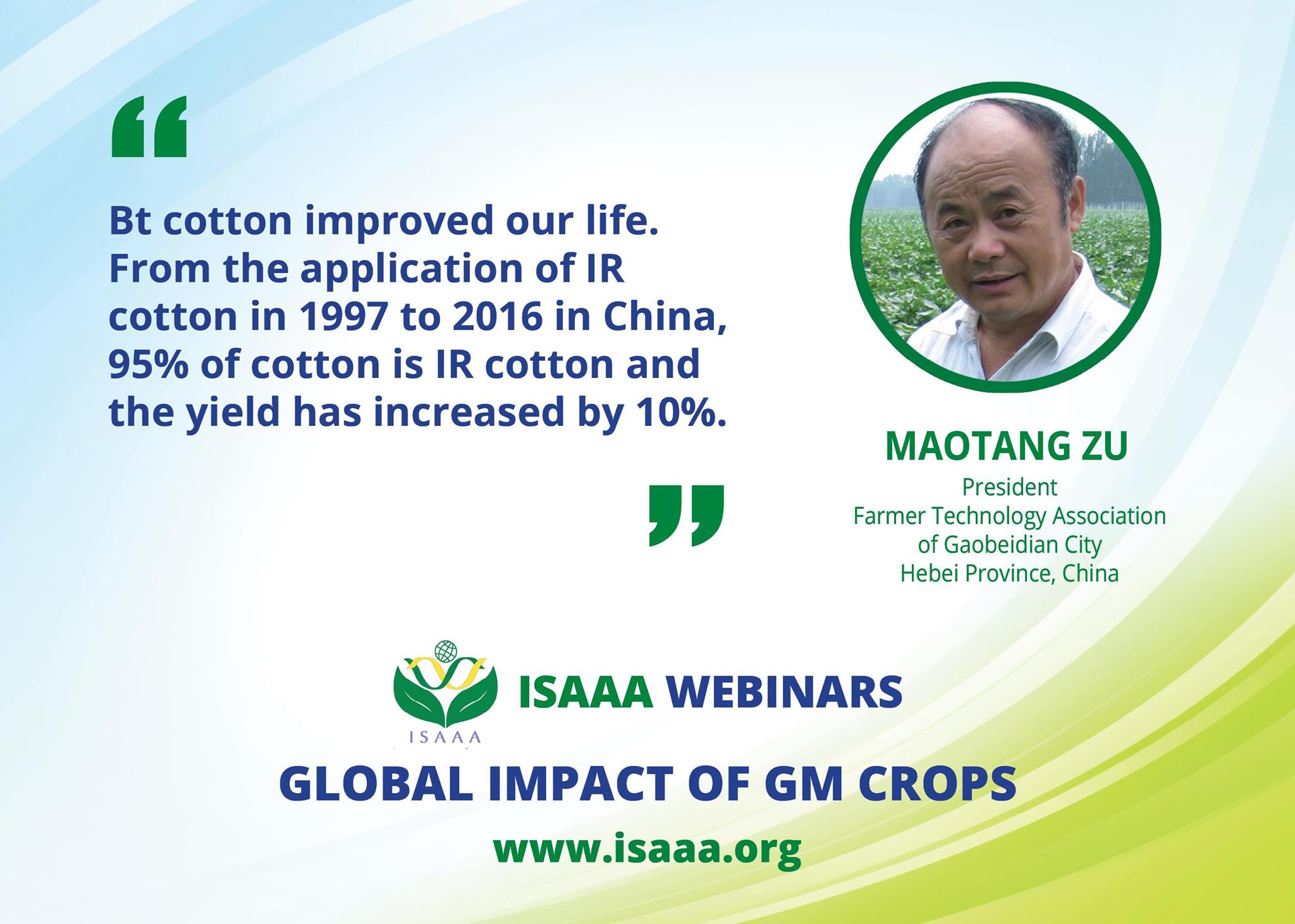
Dr. Chunyi Zang of the Institute of Crop Sciences of the Chinese Academy of Agricultural Sciences moderated the panel discussion, wherein special topics were elaborated such as the impact of the newly-approved GM corn and GM soybeans in China, as well as the importance of GM crop production and its requirements for quality food and natural biodiversity. Dr. Mahaletchumy Arujanan, ISAAA Global Coordinator, closed the webinar by stating China is a key economy in the world, and it is a key country to watch for in terms of its innovations in biotechnology and new breeding technologies.
The webinar reached 26,307 on all the platforms used.
Download the slides:
- Global Status of GM Crops in 2018-Aldemita (English | Chinese)
- Global Impact of Biotech Crops-Brookes (English | Chinese)
- The Experience in Planting Bt Cotton-Maotang
India
October 15, 2020

Alliance for Agri Innovation and Federation of Seed Industry of India co-organized the webinar for India.
Brookes reported that insect resistant (IR) cotton has impacted the lives of Indian farmers since it was introduced in 2002. In 2018, 95% of Indian farmers were using Bt cotton technology. PG Economics data show that its yield impact is +29% and the average farm income gain amounts to US$ 193.56 per hectare. In terms of return on investment, a farmer earns an extra US$ 12.95 for every US$ 1.00 spent on IR cotton seed.
The reported socio-economic impact of GM crops was supported by the success story of V. Ravichandran, an influential farmer in India and Director of the Global Farmer Network. Prior to planting Bt cotton, Ravichandran encountered the same problems that other cotton farmers had which led to a cycle that drained his resources. During a meeting organized by the South Indian Cotton Association in 2004, one of the experts suggested to him to plant one acre of Bt cotton and another acre with non-Bt hybrid cotton and compare the results. "I trust science always," he said. He followed the suggestion and added OPV for comparison. He found that Bt cotton planting was the cheapest and most profitable option. Ravichandran continues to enjoy the benefits of GM technology until today.
Dr. C.D. Mayee, President of the South Asia Biotechnology Center, talked about the impact of Bt cotton in India. He stressed that the Bt technology helped revive the cotton industry in India because of the yield advantage with reduced cost. Dr. K.C. Bansal of the Indian Agriculture Research Institute explained the biosafety aspect of biotech crops for Indian Agriculture. He highlighted the importance of employing a science-led approach that can provide a secure, economically and environmentally sound, and sustainable global food system. The webinar was moderated by Ram Kaundinya of the Federation of Seed Industry of India.
Download the slides:
- Global Impact of Biotech Crops-India-Brookes
- Impact of Bt Cotton on Production and Utility in India-Mayee
- Biotech Crops for Indian Agriculture-Bansal
- My Cotton Experience-Ravichandran
Thailand
October 26, 2020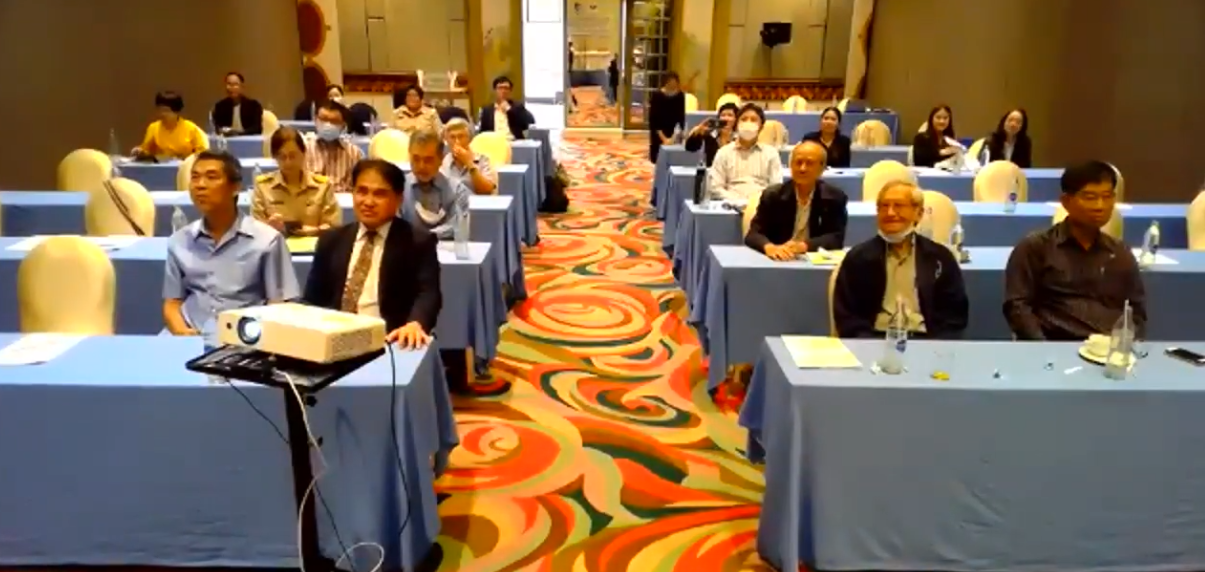
Brookes provided data about the impact of GM maize in the Philippines and Vietnam, countries that are similar to Thailand in terms of climate and agricultural settings. For the Philippines, Brookes reported that GM maize with insect resistance, herbicide tolerance, and stacked traits had an increased yield impact of 5.3%, 18.2%, and 23.5%, respectively. The total farm income gain from 2002 to 2018 is USD 972.6 million with a production impact of 4.29 million tons. Vietnam, on the other hand, adopted stacked maize technology in 2015. As of 2019, 10.2% of maize in Vietnam uses this technology. It brought the farmers' average income gain from USD 195.67 per hectare to USD 329.75 per hectare, and almost doubled their average return of investment from USD 6.84 per hectare to USD 12.55 per hectare for every extra USD 1.00 spent on the seed.
Mr. Danai Narkprasert of the Biotechnology Research and Development Office of the Department of Agriculture reported the status of agri-biotechnology in Thailand and emphasized that Thailand considers biotechnology as an important agricultural opportunity and has included it in its National Science, Technology and Innovation Policy for 2012-2021 with multiple government agencies involved in the regulation of GMOs and its products.
Mr. Sukan Sangwanna of the Federation of Agricultural Safety also gave a presentation on the farmer's view on biotech crops. Sukan, who is a multi-awarded farmer in Thailand, believes that biotechnology is a solution to farmers' problems because it produces better-quality crops faster and more efficiently than conventional crops. Contrary to popular belief, Sukan said that farmers are not afraid of GM crops because they bring more advantages than disadvantages, and that both GM crops and biotechnology are known to be science-based. According to his presentation, it is the GM-opposing organizations, who are not farmers nor agriculture professionals, that object to the farmers' use of GM crops thus hindering Thailand's prosperity. Sukan also appealed to the Thai government to pass the Biosecurity Law of the country so that farmers will finally gain access to GM crop adoption.
The webinar was co-organized by the Biotechnology Alliance Association of Thailand.
Download the slides:
- Status of Agricultural Biotechnology in Thailand-Narkprasert
- GM Crops in Thailand Farmers’ Perspective-Sangwanna
Pakistan
November 17, 2020
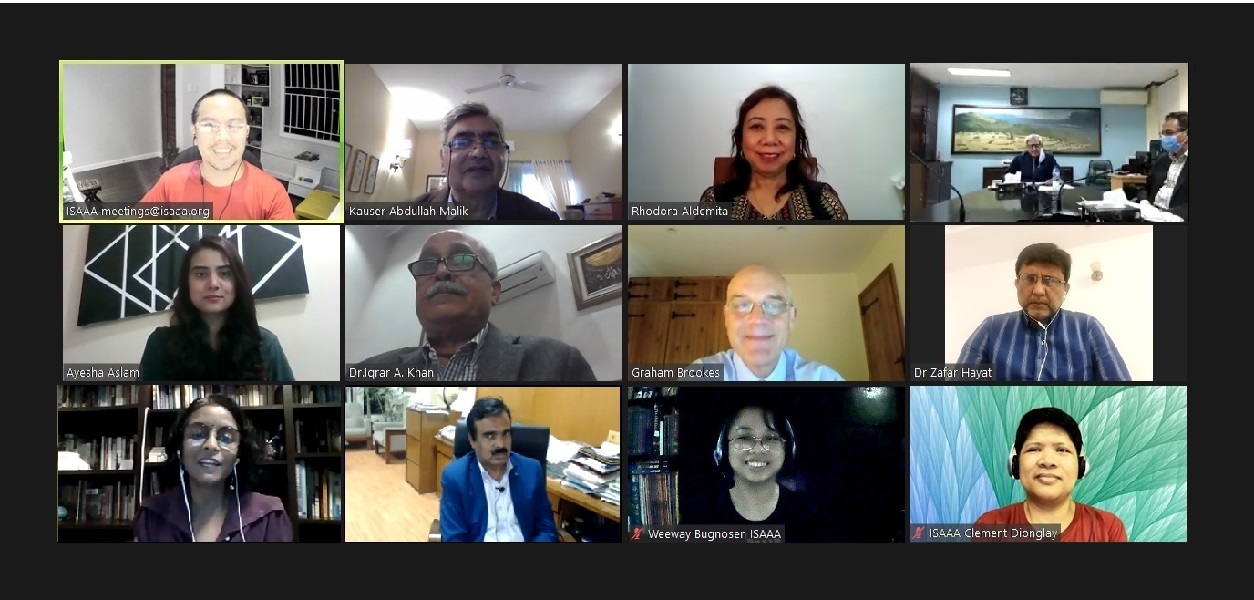
Pakistan Biotech Information Center Lahore Director Kauser Abdulla Malik gave an update on the current status of agri-biotech in Pakistan followed by a report on biotech crop adoption and acceptance in Pakistan by Dr. Shahid Mansoor of the National Institute for Biotechnology and Genetic Engineering, who emphasized that Pakistan needs new technologies like NBTs because the country's genetic gain rate is slow and NBTs can offer transgene-free genetic gain.
Dr. Zafar Hayat, a medical doctor and the president of the Farmers Bureau of Pakistan, presented from a stakeholder's point of view. He reported that while GM cotton performed very well when it was introduced in the 1990s, it is now time for new and better technologies to be introduced in Pakistan so that farmers of today can have the same benefits as the farmers from 20 years ago who planted GM cotton. He also mentioned that myths about GM technology that are not backed by science also affected the confidence of the farmers towards GM crops. Federal Minister Syed-Fakhar Imam echoed the views of the previous speakers and stated that biosafety regulations in Pakistan need to evolve and be updated in order to support the farmers who would like to receive new technologies that can help them. He also called for the promotion of science-based facts and evidence to guide regulators, developers, and beneficiaries alike in exploring the opportunities that GM crops can bring to Pakistan. Dr. Mahaletchumy Arujanan, the Global Coordinator of ISAAA, closed the webinar with another appeal to GM critics to speak to the farmers first before speaking for them.
The webinar reached 211 participants on Zoom and a total of 1,837 through all platforms. The full episode can be viewed on the ISAAA YouTube channel.
Download the slides:
- Global Impact of Biotech Crops-Pakistan-Brookes
- Biotech Crop Adoption and Acceptance in Pakistan-Dr. Shahid Mansoor
- Current Status of Agricultural Biotechnology in Pakistan-Dr. Kauser Abdula Malik
- Farmer’s View on Biotech Crops-Dr. Zafar Hayat
Indonesia
November 27, 2021
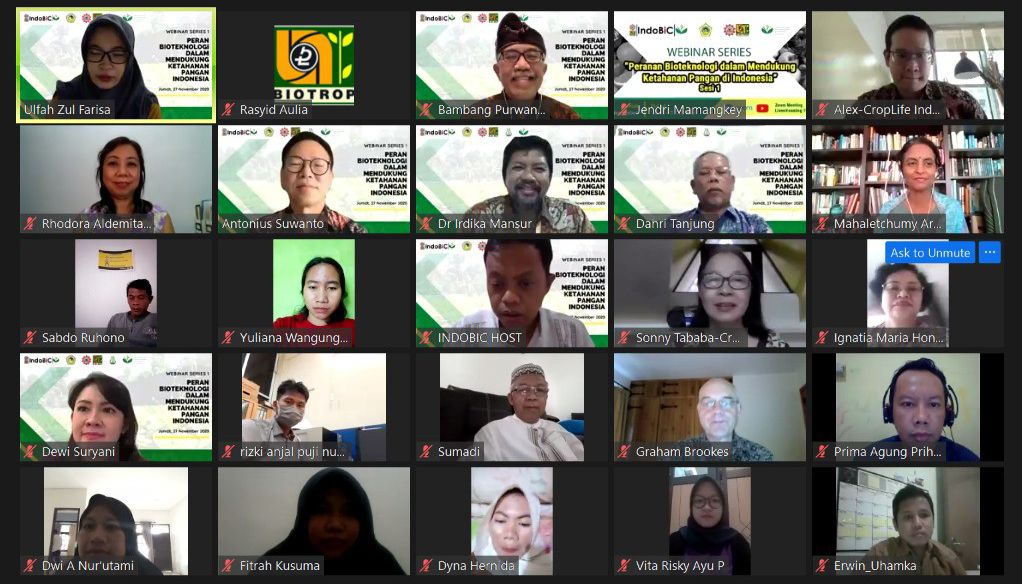
The Indonesian Biotechnology Information Center (IndoBIC) organized the webinar delivered in Bahasa Indonesia, in collaboration with SEAMEO BIOTROP, the Andalan Fisherman Farmers Group (KTNA), the Indonesian Agricultural Biotechnology Association (PBPI) and ISAAA. There were around 126 participants consisting of scientists, academics, students, students, media, the general public, and the private sector.
Aside from the sessions of Brookes and Dr. Romero-Aldemita. Prof. Antonius Suwanto from Institut Pertanian Bogor (IPB) presented the basic concept of biotechnology and stressed its benefits to agriculture including developing superior crop varieties, enhancing the nursery process, and overcoming land limitations in addition to controlling plant pests.
Dr. Dahri Tanjung from IPB explained the results of an ex-ante study conducted to determine the socio-economic impact of biotech potato development in Indonesia. He revealed that seeds produced from biotechnology will have several advantages including resistance to pests and diseases, reducing production losses, saving production costs, having good nutritional content, and a good phenotypic appearance. He further explained the economic impact caused by the use of biotech potato seeds that could be enjoyed, among others: increased exports and decreased imports, the possibility of increasing foreign exchange, increased income of potato farmers, and increased employment opportunities.
Vietnam
April 7, 2021
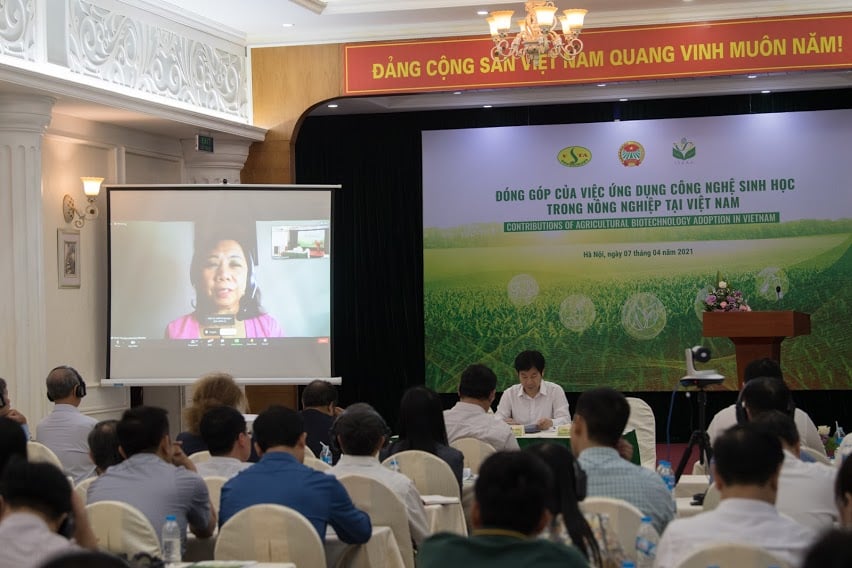
Vietnam Seed Trade Association (VSTA), together with the Vietnam Farmers' Union (VFU), and ISAAA co-organized the hybrid webinar attended by representatives of state management agencies, scientists, representatives of the provincial departments of agriculture, international experts, and domestic and foreign seed companies. The press release details the activities held during the workshop.
Dr. Tran Xuan Dinh, General Secretary of Vietnam Seed Trade Association, and Mr. Nguyen Xuan Dinh, Vice Chairman of Vietnams Farmers' Union, shared about Vietnam's experiences and perspectives on agri-biotech. Dr. Le Huy Ham, Chairman of the National GM Food Feed Committee, served as the moderator of the discussions.
A total of 126 participants joined the event online and on-site. Download the workshop materials (in English and Vietnamese) for more information.
Subscribe to the Crop Biotech Update to get updates on the ISAAA Webinars.
| Newer Post | Archive | Older Post |
Science Speaks is ISAAA Inc.'s official blog. Weekly blog articles, authored by ISAAA writers, partners, and invited contributors, aim to help share, disseminate, and promote scientific knowledge and its vital role in achieving global agricultural sustainability and development. Your support to Science Speaks will help us achieve this goal. You can help us by donating as little as $10.

